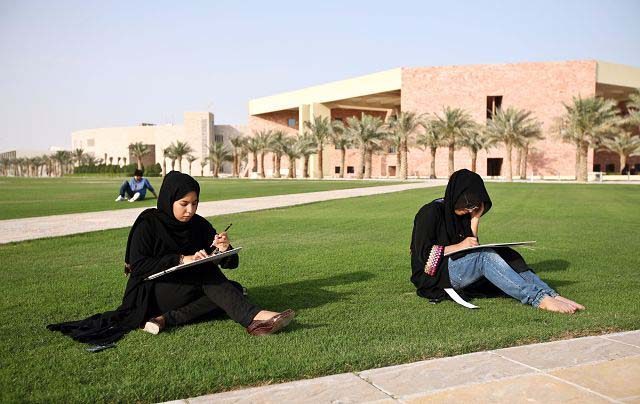
With reporting from Ankita Menon
In a move aimed at recognizing “loyalty” to Qatar, Education City officials have adjusted the criteria for merit-based scholarships to favor university students who were born or grew up in Qatar.
Scholarship applicants with those strong residency ties to Qatar would receive additional points on their application process.
The move by Hamad bin Khalifa University (HBKU), which oversees Education City and falls under Qatar Foundation, has drawn the ire of some students and sparked an online petition – which has so far garnered 50 signatures – that argues international students coming from abroad will have drastically reduced chances of receiving a scholarship.
According to the petition:
“The HBKU Merit Scholarship is most often cited as the primary reason students choose to come to EC from abroad. With that option no longer available to them, universities in EC will no longer be able to attract the caliber of international students it has been able to in the past.”
HBKU did not respond to repeated requests for comment.
Students typically become eligible for the HBKU merit scholarship after their first year of study.
Because of this, the petition states that the changes are especially unfair to students who enrolled in EC universities last year with the understanding that they could compete for a merit-based scholarship this fall, on an equal footing with their peers already residing in the country.
The changes do not affect other forms of monetary assistance, such as loans given to students in financial need, or entrance awards.
Expats in Qatar
HBKU’s shift comes amid an ongoing debate in Qatar and across the Gulf over extending certain residency benefits to long-time expats in lieu of citizenship, which these countries typically do not grant to foreigners.
Regardless of how long they’ve lived in Qatar, expats must continually renew their residency permits, which are tied to employer sponsorships, and are at risk of being forced to leave the country at any time.
In some regards, the changes in the program reward expats. Additionally, many other nations have policies aimed at retaining and attracting young and educated graduates who have ties to the country.
However, critics of the new scholarship standards argue that the new changes in criteria could discourage bright international students from considering attending university in Qatar.
Speaking to Doha News, Ahwaz Akhtar, a sophomore studying international economics at Georgetown University School of Foreign Service in Qatar, said:
“The change in criteria only reflects one of the many criticisms of Qatar: your skills and qualifications are not always the most valuable asset you have.”
Akhtar said he received a scholarship worth $44,280 to cover his tuition fee last fall and would not be affected by the changes as the financial award will be automatically renewed if he maintains a 3.6 GPA, but added that the changes still bothered him.
“It’s time HBKU went back to rewarding merit because it’s the best way to ensure that the culture of knowledge creation takes hold in Qatar,” he said.
Meanwhile, Northwestern University in Qatar said it has heard the objections of its students and is “concerned” by the changes. Speaking to Doha News, spokesperson Paul Reilly said the school has voiced its apprehensions to QF and HBKU.
Several other schools contacted by Doha News either did not return messages or referred inquiries to HBKU.
Uneven footing
Under the new criteria, scholarship applicants can receive up to 20 points on a 100-point scale in recognition of their “loyalty (to) the state of Qatar and their willingness to work/live in Qatar and contribute in return.”
Specifically, students will receive five points if they were born in the country and up to 15 points depending on how long they’ve lived in Qatar.
Applicants are also eligible for an additional 10 points for their “contributions to Qatar society.”
Students with a parent working at QF, HBKU or one of its subsidiaries automatically receive an additional 10 points. Applicants also receive points, to a maximum of 10, for the number of credit hours taken during the previous academic year.
The weighting is heavily tilted towards academic merit, with up to 50 points available to students with a high GPA. Critics, however, point out that this is unlikely to be a deciding factor as students must have a minimum GPA of 3.6 to apply for the scholarship.
This means that all eligible students will receive a minimum of 45 out of 50 points in this category, making it more likely that residency points will determine who receives a scholarship.
Here’s the criteria:
Thoughts?







